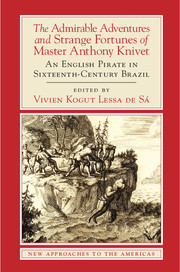 The Admirable Adventures and Strange Fortunes of Master Anthony Knivet
The Admirable Adventures and Strange Fortunes of Master Anthony Knivet Book contents
- Frontmatter
- Dedication
- Contents
- List of illustrations
- List of abbreviations
- Introduction
- Note on the Text
- The Admirable Adventures and Strange Fortunes of Master ANTONIE KNIVET, Which Went with Master THOMAS CANDISH in His Second Voyage to the South Sea. 1591.: I
- The Admirable Adventures and Strange Fortunes of Master ANTONIE KNIVET, Which Went with Master THOMAS CANDISH in His Second Voyage to the South Sea. 1591.: II
- The Admirable Adventures and Strange Fortunes of Master ANTONIE KNIVET, Which Went with Master THOMAS CANDISH in His Second Voyage to the South Sea. 1591.: III
- The Admirable Adventures and Strange Fortunes of Master ANTONIE KNIVET, Which Went with Master THOMAS CANDISH in His Second Voyage to the South Sea. 1591.: IIII
- The Admirable Adventures and Strange Fortunes of Master ANTONIE KNIVET, Which Went with Master THOMAS CANDISH in His Second Voyage to the South Sea. 1591.: V
- Appendixes
- Selected Bibliography
- Acknowledgments
- Index
Introduction
Published online by Cambridge University Press: 05 September 2015
- Frontmatter
- Dedication
- Contents
- List of illustrations
- List of abbreviations
- Introduction
- Note on the Text
- The Admirable Adventures and Strange Fortunes of Master ANTONIE KNIVET, Which Went with Master THOMAS CANDISH in His Second Voyage to the South Sea. 1591.: I
- The Admirable Adventures and Strange Fortunes of Master ANTONIE KNIVET, Which Went with Master THOMAS CANDISH in His Second Voyage to the South Sea. 1591.: II
- The Admirable Adventures and Strange Fortunes of Master ANTONIE KNIVET, Which Went with Master THOMAS CANDISH in His Second Voyage to the South Sea. 1591.: III
- The Admirable Adventures and Strange Fortunes of Master ANTONIE KNIVET, Which Went with Master THOMAS CANDISH in His Second Voyage to the South Sea. 1591.: IIII
- The Admirable Adventures and Strange Fortunes of Master ANTONIE KNIVET, Which Went with Master THOMAS CANDISH in His Second Voyage to the South Sea. 1591.: V
- Appendixes
- Selected Bibliography
- Acknowledgments
- Index
Summary
In October 1592 English privateer Thomas Cavendish sailed away from the island of São Sebastião in southeast Brazil never to see land again. He had left behind around fifty of his men on the beach to fend for themselves or possibly die at the hands of the Portuguese. Among them was Anthony Knivet who, against all odds, managed not only to survive, but to live to tell the story of his eventful years in Brazil. His account, first published in London in 1625 as “The admirable adventures and strange fortunes of Master Anthonie Knivet,” is now printed for the first time as a separate and annotated edition.
In his “relation,” as he calls it, Knivet recorded several aspects that characterized Brazilian colonial society in its very beginnings: the harsh life at the engenhos, the multiracial settlements, the political disputes, the exploitation of labor, and the violent expansion toward the unknown “interior.” The text is a source for understanding the social relationships between Brazil's early colonizers – landlords, freemen, mercenaries, prisoners, clergymen – and between them and Brazil's first inhabitants, a myriad of indigenous tribes inhabiting a large part of its territory. Nonetheless, what grants Knivet's testimony much of its uniqueness is his distinctive point of view as an Englishman caught up in the conflicting and complex encounters between rival European powers and the inhabitants of Brazil, both indigenous peoples and European settlers. His narrative, published thirty-three years after he first arrived in Brazil, remains the country's oldest extensive account written by an Englishman. It is not surprising that his editor, Samuel Purchas, upon introducing Knivet's testimony, stated that “in divers expeditions for war and Merchandize with the Portugalls, and escapes from them, [he] traveled thorow more of those savage nations, then perhaps any other before or since.” Although other English travelers touched the coast of Brazil in the sixteenth century or even lived there for some time, none wrote such a detailed impression of its land and peoples.
1. Brazil in the Sixteenth Century
Knivet and Other Early Chroniclers
Between 1592 and 1599 Knivet experienced a number of extraordinary adventures that included an escape to Angola in Africa.
- Type
- Chapter
- Information
- The Admirable Adventures and Strange Fortunes of Master Anthony KnivetAn English Pirate in Sixteenth-Century Brazil, pp. 1 - 42Publisher: Cambridge University PressPrint publication year: 2015
